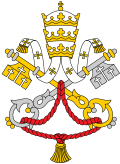Description
The Council "worked for a deeper understanding of the Church’s teaching"; "encouraged studies in the spirituality of marriage and the family"; [3] worked "to ensure the accurate recognition of the human and social conditions of the family institution everywhere"; [4] and "strove to ensure that the rights of the family be acknowledged and defended even in the social and political realm" and "supported and coordinated initiatives to protect human life from the first moment of conception and to encourage responsible procreation." [5] More particularly, the Council "promoted and coordinated pastoral efforts related to the issue of responsible procreation, and encouraged, sustained and coordinated initiatives in defense of human life in all stages of its existence, from conception to natural death." [6]
The Council's last President was Archbishop Vincenzo Paglia. In addition to its advisory board of Bishops, members of the Council included laypeople, especially married laypeople "from all over the world." [7]
On 6 June 2006, the Council published a document entitled Family and Human Procreation, noting that "Never before has the natural institution of marriage and the family been the victim of such violent attacks." [8]
This page is based on this
Wikipedia article Text is available under the
CC BY-SA 4.0 license; additional terms may apply.
Images, videos and audio are available under their respective licenses.
